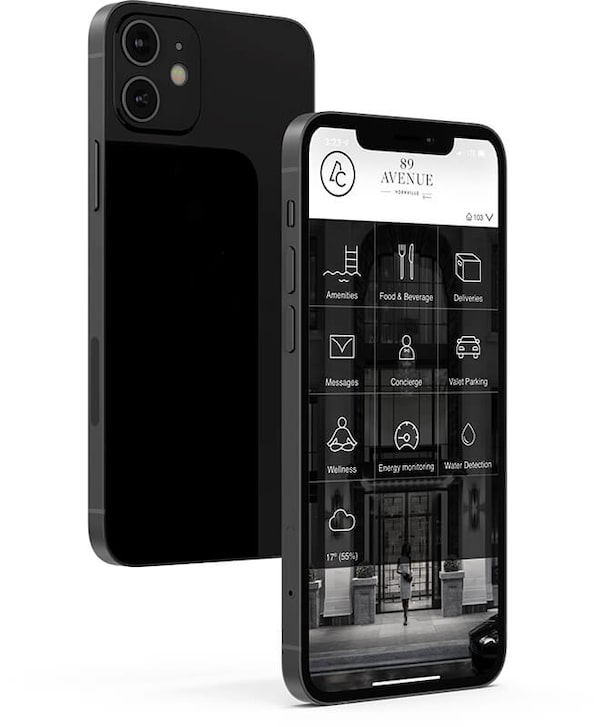
Residents of 89 Avenue Yorkville by Armour Heights Developments will benefit from a custom mobile app, below, that connects them with local amenities and service providers, as well as the building’s porter, valet and security.Supplied
Ever-present but unobtrusive advancements are changing the luxury buying process, as well as how people get around their buildings, park their cars, access services and more
Emerging technologies have had a significant impact on the real estate industry in recent years, transforming how it operates and what it offers, but the sector is likely to experience more change in the coming years with the advent of new innovation.
“Historically, the housing sector has been slower to adopt technology, relative to other industries. But the pandemic has really pushed builders, including our organization, to implement technology to re-evaluate and streamline processes, and to enhance our product offering,” says Mimi Ng, senior vice-president of residential sales and marketing at Menkes Developments Ltd.
Technology is becoming a key component of homes in every price range today, says Frank Mazzotta, president of Armour Heights Developments, the developer of 89 Avenue Yorkville.
“At 89 Avenue, given our focus on bringing the best of the world to a very exclusive clientele, technology is unobtrusively present everywhere throughout our residence,” Mazzotta says.
High-tech features at 89 Avenue are present quite literally from the ground up, starting with its state-of-the-art automated parking system. The three-level automated system has been designed to fit the full length of a Rolls-Royce as well as the height of a Mercedes-Benz G-Wagon.
“When residents enter from Avenue Road to the porte cochère, our valet will drive the vehicle onto the pallet or the owners may park their vehicle on the pallet themselves. A personal code entered will then lower the vehicle into the underground garage and store it in the first available space. That same code will retrieve the vehicle back to the main entry. The system is a smart system that begins to recognize the schedule of the vehicle,” he says. “For example, if an owner leaves the building every morning at 9 a.m., the system will move the vehicle up closer in the queue so that the time for the vehicle to be brought back at ground level is faster. The pallet will include charging stations for electric vehicles. Trickle chargers will also be available on the pallets so that car batteries do not die if clients should be away for an extended period of time.”
The development also will include two high-speed destination elevators with direct access only to a specific floor with uninterrupted service going up and down. The elevator also uses proximity technology and will recognize when a resident enters the building and will bring the elevator to ground level. There will also be one separate elevator for pets, service people or for moving, so the two main elevators are not disrupted.
Residents of 89 Avenue will also benefit from a mobile app that has been developed to allow residents to connect with local restaurants, salons, spas, gyms and other boutiques and service providers. The custom app will give residents access to online booking systems for reservations, with menus available within the app. The app will also connect residents directly to the building’s executive concierge team, including the porter, valet and security.
The Rockport Group has been at the forefront of adopting technologies that advance the quality of the homebuying experience, says president and chief operating officer Daniel Winberg.
“When we launched The Davisville in 2021, we recognized the need for virtual options and, instead of building a traditional scale model for our presentation centre, we went fully virtual and utilized new 3-D technology to model the entire building. We use interactive software and touchscreens in our presentation gallery to move purchasers around the building, open up multiple floor plans and easily reference floorplates, sold and unsold suites, etc.”

ARMOUR HEIGHTS DEVELOPMENTS
The 2021 CHBA Home Buyer Preference Survey, the largest market-research study of its kind in Canada, shows that prospective home buyers are placing growing importance on using a variety of digital resources in their search for a new-build home, says Kevin Lee, chief executive officer of the Canadian Home Builders’ Association (CHBA).
“New technology tools have allowed builders to have interactive floor plans on their website – a resource listed as ‘very important’ in making a final purchase decision according to 44.1 per cent of survey respondents – as well as virtual home and community tours and videos to give prospective buyers a feel for the community even if they’re not local to the area,” he says.
Patrick Pichette, vice-president of REALTOR.ca, says real estate has always lent itself well to emerging technologies. Adding a photo gallery to a listing in the 1990s made sense, as did video in the 2000s, and now on REALTOR.ca and other sites, prospective buyers can ‘walk’ through a house through virtual reality, or participate in a live streaming showing from across the globe.
Ng says that, on an operational level, Menkes has moved from what was largely an in-person selling experience to an online customer experience. Everything from sales presentations and document signings to colour and decor selections are being done digitally now. There used to be a strong opinion in the industry that people would not be comfortable buying a big-ticket item like real estate online, but buyers have proven to be surprisingly quick to adapt and embrace the technology.
“Examples of technology in our new condominium projects include keyless entry systems, upgraded security solutions and automated parcel systems. Due to health and safety concerns that have arisen from the pandemic, there’s a strong emphasis on enabling residents with contactless access throughout the building using their mobile phones,” she says. “Generally speaking, buyers are looking for more convenience and control over their suite and building features using their mobile devices and, in the luxury segment of the market, clients are seeking more customized or personalized technology solutions.”

Armour Heights Developments’ 89 Avenue Yorkville also has a high-tech, automated, smart parking system that can accommodate just about any size of luxury vehicle.ARMOUR HEIGHTS DEVELOPMENTS
An early adopter of smart home technologies, the Rockport Group is now offering iValet in The Davisville condos, says Jack Winberg, Rockport’s chief executive officer.
“This new technology from Rogers puts managing your home right in your hand. Just by pushing a button on your phone, you’ll be able to open your front door, set your in-suite temperature, see who’s come to visit you, get notifications about package arrival, book amenities and more. Metal keys will become a thing of the past,” he says.
“But perhaps the most innovative, even if it is not new, technology which Rockport is introducing at The Davisville is automated parking. Drive up, push a few buttons, enter the residence lobby and your car is parked below ground for you, safely and securely. No need to ever be alone in a concrete underground. This innovation, driven by the need to efficiently build a beautiful boutique building on a small site, will very much be the way of the future for parking in busy urban areas.”
New technologies are also allowing developers to reach greater energy efficiency in new construction. Lee says energy simulation software is playing an increasingly larger role in both new construction and renovation. An example of that kind of software is the federal government’s HOT2000, an energy simulation modelling software developed by Natural Resources Canada to support the EnerGuide Rating System, Energy Star for New Homes and other initiatives.
New technology and innovation will continue to emerge in the coming months and years that will directly impact the real estate sector. “There are now over 300 tech startups in the Canadian real estate space and more than 5,000 in the U.S.,” Pichette says.
On the horizon are cryptocurrencies, digital twins and the metaverse.
For now, Ng says cryptocurrencies have yet to be adopted in real estate transactions. The key barrier has been that governments and the traditional financial system do not have the mechanisms in place to recognize, regulate and accept them.
“This isn’t to say that this won’t eventually happen. There is growing awareness of cryptocurrencies,” Ng says. “For example, a few years ago [in 2018], Toronto City Council instructed city staff to explore the possibility of residents paying their property tax and utility bills using crypto. I suspect that we will eventually see digital currencies in real estate, once crypto is adopted by a larger and broader user base.”
Digital twins are also a nascent technology that might eventually be seen in real estate. Digital twins use data to simulate how a physical product or service will perform. And the metaverse promises a world that blurs the line between physical and virtual worlds.
“Real estate will have a big role in the metaverse. How people experience the home shopping experience will lend itself well to the metaverse as the tech evolves. How many people watch HGTV every night? Now imagine walking into these homes, renovating and even owning real estate in this parallel, virtual world,” Pichette says.
Advertising feature produced by Globe Content Studio. The Globe’s editorial department was not involved.